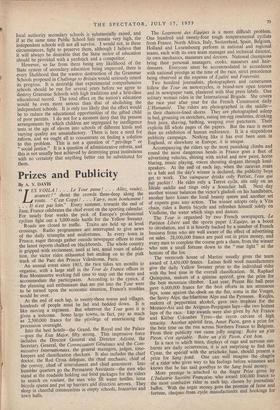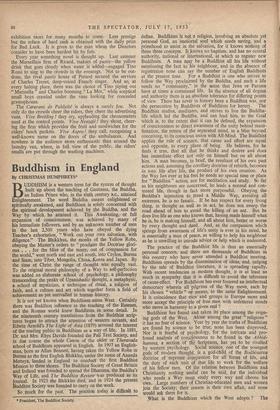Prizes and Publicity
By A. V. DAVIS 46ES VOILA ! . . . Le Tour passe ! . . . Allez, roulez, L avancez ! " shout the crowds three-deep along the route. "C'est Coppi ! . . . Vas-y, mon bonhomme ! . . . 11 n'est pas loin." Every summer, towards the end of June, France celebrates the chief event on the sporting calendar. For nearly four weeks the pick of Europe's professional cyclists fight out a 3,000-mile battle for the Yellow Sweater. Roads are closed to traffic. Trains are held up at level* crossings. Radio programmes are interrupted to give news of the daily triumphs and misfortunes. In every town in France, eager throngs gather outside newspaper offices to read the latest reports chalked on blackboards. The whole country is gripped with excitement, until at last, amid roars .of adula- tion, the victor rides exhausted but smiling on to the pink track of the Parc des Princes Velodrome, Paris.
An annual event since 1903, the race takes ten months to organise, with a large staff in the Tour de France offices in , Rue Montmartre working full time to map out the route and accommodate the participants. According to the cynics, if the planning and enthusiasm that are put into the Tour were to be turned upon the economic situation, France's troubles would be over.
At the end of each lap, in twenty-three towns and villages, hundreds of people must be fed and bedded down. It is like moving a regiment. But wherever the Tour goes it is given a welcome. Some large towns, in fact, pay as much as 2,500,000 francs for the privilege of entertaining the procession overnight. Into the best hotels—the Grand, the Royal and the Palace —goes the Etat Major, fifty strong. This impressive force includes the Director General and Director Adjoint, the Secretary General, the Commissaires Generaux and the Com- missaires Internationaux, the general managers, judges, time- keepers and classification checkers. It also includes the chief doctor, the Red Cross delegate, the chief mechanic, chief of the convoy, chief of nourishment and chief announcer. Into humbler quarters go the. Permanent Assistants—the men who stand at the roadside holding out food packages for the riders to snatch en roulant, the men who fill water bottles, issue bicycle spares and put up barriers and direction arrows. They sleep in cheerful communities in empty schools, brasseries and town halls. The Logement des Equipes is a more difficult problem. One hundred and twenty-four tough temperamental cyclists from France, North Africa, Italy, Switzerland, Spain, Belgium, Holland and Luxembourg perform in national and regional teams, each with its own team manager and technical director, its own mechanics, masseurs and doctors. National champions bring their personal managers, cooks, masseurs and hair- dressers. Everyone must be accommodated in accordance with national prestige at the time of the race, strict precedence being observed at the expense of Egalite and Fraternite.
Two hundred journalists, photographers and cameramen follow the Tour on motorcycles, in brand-new open tourers and in newspaper vans, plastered with blue press labels. One solitary woman rides in the International Brigade. She covers the race year after year for the French Communist daily L'Humanite. The riders are photographed in sthe saddle— in their chamois-lined shorts. They are photographed asleep in bed, groaning on stretchers, eating ten-egg omelettes, drinking fruit juice, shaving, bathing, weeping over punctures. Their exploits fill whole pages of the papers. But the race is more than an exhibition of human endurance. It is a stupendous publicity campaign. Nothing like it has ever been seen in England, or elsewhere in Europe; it is unique.
Accompanying the riders up the most punishing climbs and round the most dangerous bends in France goes a fleet of advertising vehicles, shining with nickel and new paint, horns blaring, music playing, voices shouting slogans through loud- speakers. At the end of each lap, when the caravan roars to a halt and the day's winner is declared, the publicity boys get to work. The vainqueur drinks only Perrier, l'eau qui fait pschitt ! He rides only a Terrot cycle, sits only on an Ideale saddle and rings only a Sonnclair bell. Next day another winner balances the victor's gladioli on his handlebars, another hero kisses the local beauty queen and another set of experts goes into action. The winner adopts only a Vita chain, rides a Bertin bicycle and refreshes himself solely on Vitelloise, the water which sings and dances.
The Tour is organised by two French newspapers, Le Parisien Libere and the sports paper L'Equipe, as a boost to circulation, and it is heavily backed by a number of French business firms who are well aware of the effect of advertising on sales. 28,000,000 francs are paid out in prize money, and every man to complete the course gets a share, from the winner who nets a small fortune down to the " rear light " at the bottom of the list.
The vermouth house of Martini usually gives the team award of 3,450,000 francs. Laines Sofil wool manufacturers give the daily Yellow Sweater prize to the individual rider with the best time in the overall classification. St. Raphael Quinquina, makers of a quinine aperitif, give the prize for the best mountain climber. Last year, Pointe Bic ball pens gave 6,000,000 francs for the best efforts in ten strenuous laps, some against the clock on the flat, some in the Vosges, the Savoy Alps, the Maritime Alps and the Pyrenees. Ricqles, makers of peppermint alcohol, gave two trophies for the Monaco-Aix and the Avignon-Perpignan laps—the two hottest laps of the race. Lap awards were alsd given by Air France and Kleber Colombes Tyres—the rayon carcase of high tenacity. Another aperitif firm, Amer Picon, gave a prize for the best time on the run across Northern France to Belgium. From their publicity van came jolly singing: Boire un p'tit Picon, c'est agreable. Boire un p'tit Picon, c'est bon. In a race in which tears, displays of rage and nervous out- bursts are daily occurrences, it is not surprising to find that Cynar, the aperitif with the artichoke base, should present a prize for Sang froid. One can well imagine the chagrin of a rider who gives way to his feelings before witnesses and knows that he has said goodbye to the Sang froid money. More prestige is attached to the Sugar Prize given by L'Industrie Sucriere Francaise, who award 100,000 francs to the most' combative rider in each lap, chosen by journalists' ballot. With the sugar money goes the promise of fame and fortune, cheques from cycle manufacturers and bookings for exhibition races for many months to come. Less prestige but the solace of hard cash is obtained with the daily prize for Bad Luck. It is given to the man whom the Directors consider to have been hardest hit by fate.
Every year something novel is thought up. Last summer the Marseillais firm of Ricard, makers of pastis—the yellow drink that goes cloudy when water is added—engaged Tino Rossi to sing to the crowds in the evenings. Not to be out- done, the rival pastis house of Pernod secured the services of Charles Trenet, deep-voiced French singer. And so, at every halting place, there was the choice of Tino piping out " Marinella " and Charles booming " La Mer," while sceptical small boys crawled under the vans looking for concealed gramophones.
The Caravane de Publicite is always a succ?s fou. Not only do the crowds cheer the riders, they cheer the advertising vans. Vive Breitling ! they cry, applauding the chronometers used at the control points. Vive Nescafe! they shout, cheer- ing the firm which provides the fruit and sandwiches for the riders' lunch packets. Vive Aspro! they call, recognising a well-known name on the doors of the ambulances. And nowhere is the audience more enthusiastic than around the laundry van, where, in full view of the public, the riders' smalls are put through the washing machines.



























 Previous page
Previous page